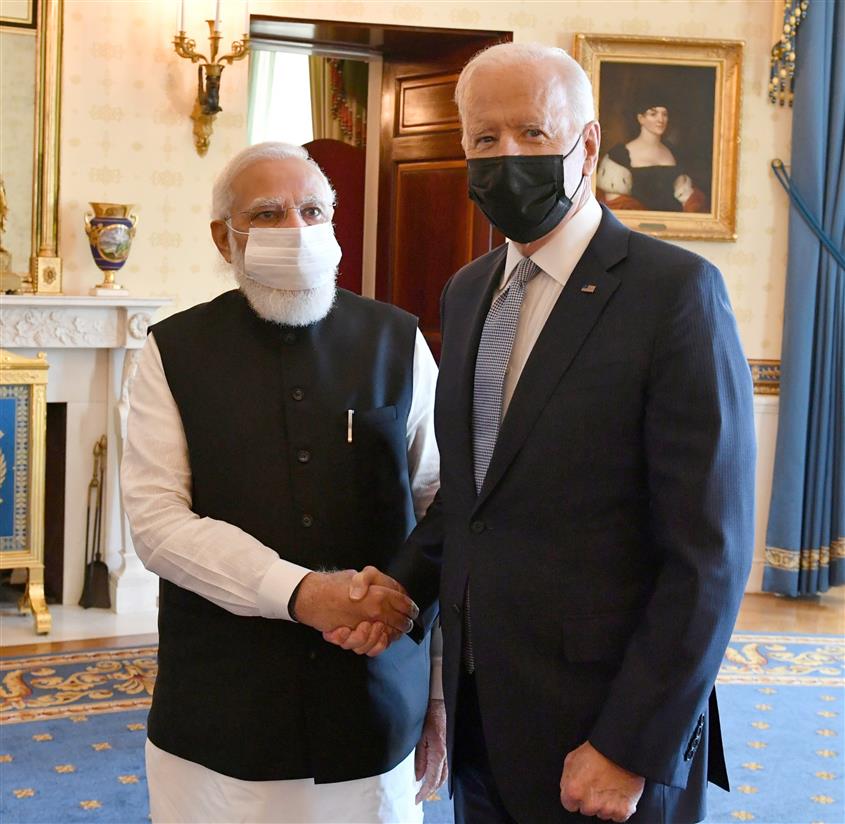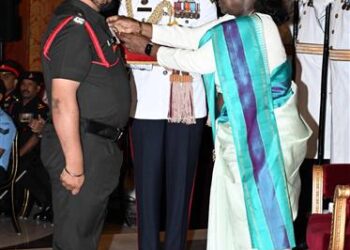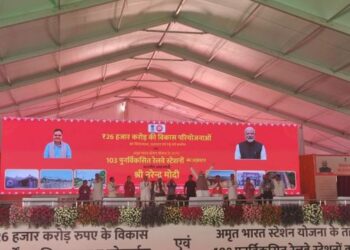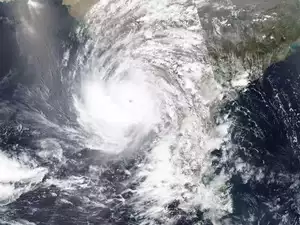President Joseph R. Biden welcomed Prime Minister Narendra Modi to the White House today for their first in-person Leaders’ engagement, renewing their close relationship and charting a new course to advance the partnership between the world’s largest democracies.
The Leaders affirmed a clear vision that will guide the U.S.-India relationship forward: building a strategic partnership and working together with regional groupings, including ASEAN and Quad members, to promote shared interests in the Indo-Pacific region and beyond; developing a trade and investment partnership that increases prosperity for working families in both countries; finishing the fight against the COVID-19 pandemic and other health challenges; galvanizing global efforts to scale up climate action; strengthening democratic values and institutions in support of our respective peoples; and enhancing people-to-people ties that have made both countries stronger.
President Biden and Prime Minister Modi expressed deep pride and appreciation about their nations’ close cooperation to fight the COVID-19 pandemic over the past year, as governments, civil society, businesses, and diaspora communities mobilized in unprecedented ways to share emergency relief supplies during each country’s times of need. Having administered hundreds of millions of doses of vaccine to protect their own citizens at home and abroad, they reiterated their commitment to lead the global effort to end this pandemic. President Biden welcomed India’s announcement that it will resume exports of safe and effective COVID-19 vaccines including to COVAX. The Leaders also hailed the finalization of the overarching Memorandum of Understanding on Health and Biomedical Sciences to bolster cooperation on key areas affecting global health, including pandemic preparedness and biomedical research, to reduce the risk of future pandemics.
Prime Minister Modi welcomed President Biden’s initiative to convene the Global COVID-19 Summit on Ending the Pandemic and Building Back Better to Prepare for the Next, given our shared commitment to combat the Covid-19 pandemic.
Prime Minister Modi welcomed U.S. leadership on climate action, including the return of the United States to the Paris Agreement. President Biden expressed support for Prime Minister Modi’s intention to achieve a domestic goal of installing 450 GW of renewable power by 2030 and acknowledged the importance of mobilizing finance for investments in renewables, storage, and grid infrastructure that will guarantee clean, reliable power for millions of Indian households. Through the two main tracks of the Strategic Clean Energy Partnership (SCEP) and the Climate Action and Finance Mobilization Dialogue (CAFMD) under the U.S.-India Climate and Clean Energy Agenda 2030 Partnership, the United States and India will accelerate clean energy development and deployment of critical technologies to advance a clean energy transition. India welcomed the United States joining the Leadership Group for Industry Transition (LeadIT).
President Biden reaffirmed the strength of the defense relationship between the United States and India and the unwavering commitment to India as a Major Defense Partner through close defense engagements in information sharing, sharing of logistics and military-to-military interactions, strengthening cooperation in advanced military technologies, and expanding engagements in a multilateral framework including with regional partners. The Leaders welcomed the deepening of advanced industrial cooperation. In this context, they noted the recent project to co-develop air-launched unmanned aerial vehicles (UAVs) under the Defense Technology and Trade Initiative, and encouraged more such joint efforts. They called upon the government and private stakeholders to use the existing ecosystems of innovation and entrepreneurship in defense industries for co-development, co-production and expanding mutual defense trade. They also looked forward to the inaugural meeting of the Industrial Security Agreement summit to facilitate high-end defense industrial collaboration.
The Leaders reaffirmed that the United States and India stand together in a shared fight against global terrorism, will take concerted action against all terrorist groups, including groups proscribed by the UNSCR 1267 Sanctions Committee, condemned cross-border terrorism, and called for the perpetrators of the 26/11 Mumbai attacks to be brought to justice. They denounced any use of terrorist proxies and emphasized the importance of denying any logistical, financial or military support to terrorist groups which could be used to launch or plan terror attacks. They noted that the upcoming U.S.-India Counterterrorism Joint Working Group, Designations Dialogue, and renewed U.S.-India Homeland Security Dialogue will further strengthen counterterrorism cooperation between India and the United States, including in the areas of intelligence sharing and law enforcement cooperation. They also welcomed opportunities to develop counterterrorism technologies. They commended the U.S.-India Counter Narcotics Working Group and are committed to finalizing a new Bilateral Framework which would facilitate joint efforts to combat drug trafficking, illicit narcotics production and precursor chemical supply chains.
The Leaders resolved that the Taliban must abide by UNSC Resolution 2593 (2021), which demands that Afghan territory must never again be used to threaten or attack any country or to shelter or train terrorists, or to plan or finance terrorist attacks, and underscored the importance of combating terrorism in Afghanistan. The Leaders called on the Taliban to adhere to these and all other commitments, including regarding the safe, secure, and orderly departure from Afghanistan of Afghans and all foreign nationals and to respect the human rights of all Afghans, including women, children, and members of minority groups. They emphasized the importance of efforts to provide humanitarian assistance to Afghanistan, called on the Taliban to allow full, safe, direct and unhindered access for the United Nations, its specialized agencies and implementing partners, and all humanitarian actors engaged in humanitarian relief activity, including with respect to internally displaced persons. Reflecting their long-term commitment to promoting development and economic opportunity for the Afghan people, they determined to continue to closely coordinate and to work jointly with partners toward an inclusive and peaceful future for all Afghans.
The Leaders called for an end of the use of violence, for release of all political detainees, and for a swift return to democracy in Myanmar. They further called for the urgent implementation of the ASEAN Five Point Consensus.
The Leaders welcomed increased cooperation under the Quad, including in the multilateral domain given their shared vision of a free, open and inclusive Indo-Pacific region with respect to territorial integrity and sovereignty, and international law. President Biden applauded India’s strong leadership during its UN Security Council Presidency in August 2021. In this context, President Biden also reiterated U.S. support for India’s permanent membership on a reformed UN Security Council and for other countries who are important champions of multilateral cooperation and aspire to permanent seats on the UN Security Council. He also reaffirmed U.S. support for India’s entry to the Nuclear Suppliers Group. They welcomed the extension of the Statement of Guiding Principles on Triangular Cooperation for Global Development to leverage the combined capacities of India and the United States to address global development challenges around the world, particularly in the Indo-Pacific and Africa. In addition, they looked forward to the launch of the U.S.-India Gandhi-King Development Foundation to advance cooperation on health, education, and the environment.
They looked forward to reconvening the India-U.S. Trade Policy Forum before the end of 2021, to enhance the bilateral trade relationship by addressing trade concerns, identifying specific areas for increased engagement and developing an ambitious, shared vision for the future of the trade relationship. The Leaders looked forward to convening the U.S.-India CEO Forum and the Commercial Dialogue in early 2022, leveraging the talents of the private sector. The Leaders noted ongoing negotiations on an Investment Incentive Agreement that facilitates investment in development projects and committed to an early conclusion. They further discussed how the United States and India will work together to set sustainable and transparent rules of the road that will lift economies throughout the Indo-Pacific. They welcomed increased collaboration through the Coalition for Disaster Resilient Infrastructure and the upcoming Indo-Pacific Business Forum.
The Leaders noted that the movement of highly skilled professionals, students, investors and business travelers between their countries enhances their economic and technological partnership. The Leaders highlighted the importance of resilient and secure supply chains between the two countries. They welcomed the involvement of the private sector in both countries in building stronger linkages in critical sectors such as pharmaceuticals, biotechnology, semiconductors, and information technology. The Leaders recognized the importance of critical and emerging technologies in delivering economic growth and achieving strategic priorities. They looked forward to reviving the High Technology Cooperation Group (HTCG) in early 2022, with the objective of accelerating high technology commerce in key areas.
The Leaders decided that the United States and India must continue and expand their partnership in new domains and many areas of critical and emerging technology – space, cyber, health security, semiconductors, AI, 5G, 6G and future generation telecommunications technology, and Blockchain, that will define innovation processes, and the economic and security landscape of the next century. The Leaders recognized the foundational need to address vulnerabilities and threats in cyberspace, including to promote critical infrastructure resilience, and welcomed the increasing partnerships among governments to counter ransomware and other cyber-enabled crime, including efforts to combat cybercriminals that operate from within their borders. The Leaders reiterated the importance of sustainable capacity-building and noted that mutual technical assistance efforts to respond to cyber threats should be prioritized and increased, including through dialogues, joint meetings, training and sharing of best practices. They looked forward to the finalization of a Space Situational Awareness Memorandum of Understanding that will help in sharing of data and services towards ensuring the long-term sustainability of outer space activities by the end of the year.
As global partners, the United States and India resolved to further strengthen their collaboration in education, science and technology and people-to-people engagement. The Leaders welcomed close consultations through the 2+2 Ministerial Dialogue of the Foreign and Defense Ministers of India and the United States to be held later this year.
The Leaders celebrated the deep and vibrant ties between the people of both nations, which underpins the special bond between the United States and India, and has sustained their partnership for nearly 75 years. They reaffirmed, and encouraged others to embrace, their shared values of freedom, democracy, universal human rights, tolerance and pluralism, and equal opportunities for all citizens, and committed to pursue efforts towards sustainable development and global peace and security.
Prime Minister Modi conveyed his deep appreciation for the repatriation of antiquities to India by the United States. The Leaders committed to strengthen their efforts to combat the theft, illicit trade and trafficking of cultural objects.
Reflecting shared values and principles, and growing strategic convergence, President Biden and Prime Minister Modi resolved to advance the U.S.-India Comprehensive Global Strategic Partnership, and looked forward to what the United States and India will achieve together.
Source:PIB
visit at: www.shree1news.com







 Finance
Finance





